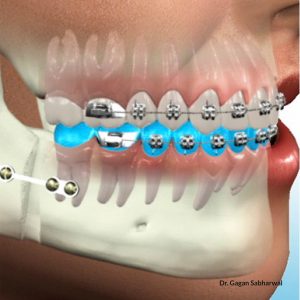
TM joint pain can cause a considerable amount of discomfort and this results in making normal day-to-day activities such as speaking or chewing difficult to do. Those with chronic jaw clicking or unbearable pain may go for jaw pain surgery that addresses problems caused by structures within the jaws. Correct diagnosis and intervention are important to not only relieve symptoms but also enhance all of the jaw’s associated functions.
Signs and Symptoms of TMJ Disorders

- Jaw, face or neck pain
TMJ dysfunction is usually associated with chronic pain, such as jaw pain and neck or facial discomfort. The discomfort may be continuous or strike only when you are doing activities such as speaking and eating. A TMJ Disorder Specialist can determine if this pain is from jaw lock or muscle strain.
- Having difficulty or discomfort when chewing
TMJ disorders can interrupt or deter your ability to chew, as the temporomandibular joint will be stiffened up and inflamed. In very serious cases though, a Maxillofacial Surgeon may need to evaluate the patient and determine if TMJ Disorder Surgery is necessary in order to bring back full jaw movement as well as alleviate any pain.
- When opening/closing mouth Clicking or popping sounds
Another common TMJ dysfunction signal is jaw clicking or popping sounds. This wear is often painless, but clicking and popping in the knee from time to time can indicate misalignment or potential for more severe injury. The decision regarding whether or not TMJ Disorder Surgery is needed for long-term correction and is a Maxillofacial Surgeon role.
- Limited range of jaw movement
Problems with the TMJ may reduce jaw mobility, while a lockjaw or an incapacity of fully opening the mouth. In cases where non-invasive treatment methods prove unsuccessful, a TMJ Disorder Specialist may advise surgical intervention in order to restore the full range of motion.
- Headaches or ear aches
Many people experience headaches and ear problems as a result of their TMJ disorder because pressure is exerted on the nerves that are nearby. Root Cause Diagnosis — Here, a Maxillofacial Surgeon’s role comes into play to identify the root cause and give an assessment of whether there are surgical interventions that can relieve these chronic symptoms.
Role of an Oral and Maxillofacial Surgeon

An oral and maxillofacial surgeon in Dubai specializes in the diagnosis and treatment of complex facial, jaw, and mouth orders. It provides more complex interventions for serious cases of TMJ disorders that may not respond to conservative methods. In fact, patients with ailments such as TM joint pain, jaw clicking or even a phenomenon called jaw lock can be effectively helped by their expertise. Depending on individual conditions, surgical intervention such as arthrocentesis, TMJ arthroscopy or open-joint surgery may be recommended. At the same time, in a professional way that you never knew existed before as it does when dealing with the maxillofacial surgeon in Dubai who is all set to provide full-care services offering patients nothing less than optimal, personalized treatments and evaluations for abating normal condition and pain of temporomandibular joint disorders.
Non-Surgical Treatment Options
The initial approaches to TM joint pain often include physical therapy, medications for relieving pain or orthotics like custom mouthguards designed to alleviate symptoms. Or, if jaw clicking or pain is still a problem after that, interest in performing corrective surgery involves repairing structural issues through procedures meant to last through the years and improve how your jaws operate.
When Surgery Becomes Necessary
If the jaw lock or severe pain has not been relieved by non-surgical treatments then surgery is considered. The TMJ Disorder Specialist collaborates with a Maxillofacial Surgeon to alternatively address and correct structural issues, such as misaligned jaws or damaged joint tissues providing long-term relief through proper jaw function.
TMJ Surgery Types
- Arthrocentesis: A relatively low-risk procedure where the doctor flushes out your joint.
- TMJ Arthroscopy: A minimally invasive surgical procedure that involves Using a small camera to treat TMJ problems.
- Open-joint: It is a technique intended for more intricate issues where bones or any disorders in tissues may be involved.
Post-Surgical Recovery and Care
Post-TMJ Disorder Surgery, an oral and maxillofacial surgeon Dubai helps patients recover by suggesting physical therapy and lifestyle changes that ensure lasting relief from the disorder. This is where the support of a maxillofacial surgeon in Dubai proves exceptional by making available personalized post-surgery care that allows patients to restore full jaw function and obtain minimal discomfort, improving their total life satisfaction.
Consultation and Diagnosis
A comprehensive examination by oral and maxillofacial surgeon in Dubai, doing imaging studies and clinical examinations to diagnose TMJ disorders accurately. With these investigations, they are able to devise bespoke treatment programs focusing on individual problems so the patient is provided with specialized care guided by evidence-based decision-making and tailored solutions inclusive of non-surgical treatments or surgery.
Conclusion
Therefore, to treat TMJ disorders, proper therapy is required which should be done by a proficient Oral and Maxillofacial Surgeon. You will get the ideal treatment that fits your dental needs from Dr. Gagan Sabharwal Clinic. Book a consultation to begin your journey towards relief from pain and restoring function in the jaw!